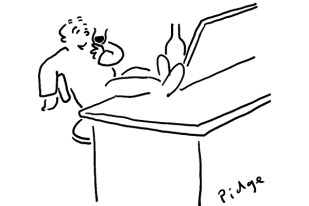The title of this collection of journalism is a problem. Not the Kant’s Little Prussian Head bit, which, though opaque, is explained in the text. It’s from Thomas Bernhard’s novel The Loser and is quoted by Claire Messud in the title essay: ‘We study a monumental work, for example Kant’s work, and in time it shrivels down to Kant’s little East Prussian head.’ As a novelist, she explains, she strives to resist that shrivelling — to avoid being condensed into a ‘little American head’, to retain and convey all the detail of life.

The problem is with the claim that this is an autobiography through essays. It isn’t. It’s a compilation of pieces previously published elsewhere — some autobiographical, some critical works on writers and artists. The disappointment of not receiving quite what was promised compounds the frustrations which are common to this kind of anthology.
What feels like well-crafted conciseness in the columns of a periodical comes over as abrupt between the covers of a book. The tone jolts around: you ease into a funny-profound account of Messud’s disastrous dogs (one incontinent, one blind, both absurdly loved, to the point that some of Messud’s friends ‘see it as our moral failing that the dogs are still alive’), and are suddenly pitched into a slightly glib listicle called ‘How to Be a Better Woman in the Twenty-First Century’.
Then there’s the tendency of all writers to repeat themselves, which is exposed by gathering everything in one place: few people truly have more than half a dozen opinions, and there are 26 essays here. But Messud is a very good critic, the kind whose writing makes you bring new eyes to the familiar and creates inviting familiarity with what’s new to you. I’ve never read Jane Bowles, but Messud’s description of Two Serious Ladies means I will; her precise diagnosis of the tragedy in Never Let Me Go as the murder of hope means I will be rereading Ishiguro shortly.
With her pieds noirs background, Messud is beautifully attuned to the tangled loyalties in Camus
Best of all is her commentary on Camus, which also comes closest to fulfilling the title. Messud’s father’s family, like Camus, were pieds noirs — French citizens living in colonial territories. It’s a background that makes her beautifully attuned to the tangle of loyalties in Camus. In her hands, it is obvious that to call him simply a ‘French author’ is to blot out his essential Algerian-ness, and both her family’s story and Camus’s writing are enriched by the contact. A whole book of that — a true autobiography through essays — would be a deep pleasure to read.






Comments